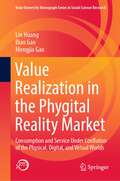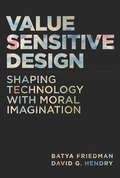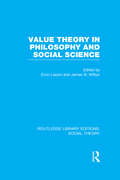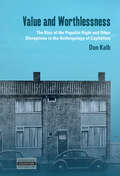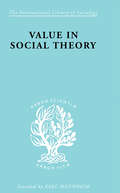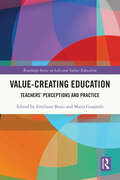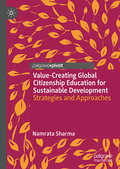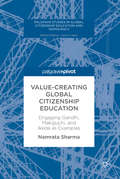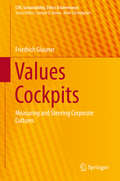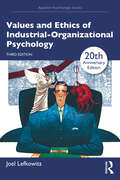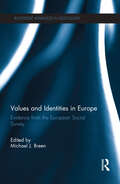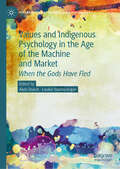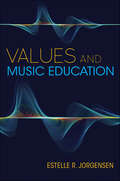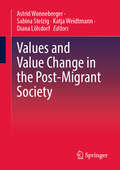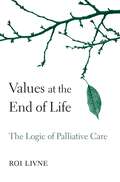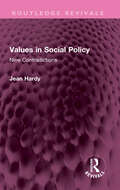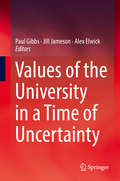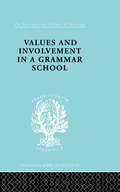- Table View
- List View
Value Realization in the Phygital Reality Market: Consumption and Service Under Conflation of the Physical, Digital, and Virtual Worlds (Kobe University Monograph Series in Social Science Research)
by Lin Huang Biao Gao Mengjia GaoThis book is a timely and much-needed comprehensive compilation that reflects the development of research on consumption and communication in the conflation of the real and digital worlds, bringing together the current state of thinking about the phygital reality market and the cutting-edge challenges that are involved. In this book, the term “phygital reality market” is used, implying that the physical, digital, and virtual realms are fused into one to recognize and understand the market with multiple or mixed realities. The concept of the phygital reality market captures the new realities that consumers are shopping, consuming, and living, and companies are competing within the physical, digital, and virtual marketplaces. The book covers the research on consumption, service, and communication in the phygital reality market and compiles the current state of thinking, challenges, and cases having to do with the acceptance and diffusion of new technologies of phygital reality. The interest in the phygital reality market, such as omnichannel retailing integrating physical stores and online services, has grown hugely over the last two decades, particularly since the coronavirus pandemic. COVID triggered severe social and economic disruption around the world but has accelerated the acceptance and diffusion of new technologies in the phygital reality market, where the physical, digital, and virtual worlds are conflated. Versatile problem solving and new challenges are reflected in the value realization process of innovation — in other words, widespread acceptance and diffusion of devices or services that embody new technologies. The excitement and hype associated with the metaverse have highlighted the need to understand the creation and adoption of new technologies in consumption and marketing, recognition of the foundational role of new technologies in driving consumer behavior, and marketing theory and practice in value realization as a vital part of the process of digital transformation.
Value Sensitive Design: Shaping Technology with Moral Imagination
by Batya Friedman David G. HendryUsing our moral and technical imaginations to create responsible innovations: theory, method, and applications for value sensitive design. Implantable medical devices and human dignity. Private and secure access to information. Engineering projects that transform the Earth. Multigenerational information systems for international justice. How should designers, engineers, architects, policy makers, and others design such technology? Who should be involved and what values are implicated? In Value Sensitive Design, Batya Friedman and David Hendry describe how both moral and technical imagination can be brought to bear on the design of technology. With value sensitive design, under development for more than two decades, Friedman and Hendry bring together theory, methods, and applications for a design process that engages human values at every stage. After presenting the theoretical foundations of value sensitive design, which lead to a deep rethinking of technical design, Friedman and Hendry explain seventeen methods, including stakeholder analysis, value scenarios, and multilifespan timelines. Following this, experts from ten application domains report on value sensitive design practice. Finally, Friedman and Hendry explore such open questions as the need for deeper investigation of indirect stakeholders and further method development. This definitive account of the state of the art in value sensitive design is an essential resource for designers and researchers working in academia and industry, students in design and computer science, and anyone working at the intersection of technology and society.
Value Sets for EQ-5D-5L: A Compendium, Comparative Review & User Guide
by Nancy Devlin Bram Roudijk Kristina LudwigThis open access book provides an essential guide to value sets for anyone working with EQ-5D-5L data. The EQ-5D-5L is one of the most widely used health related quality of life questionnaires around the world, with applications in clinical trials, population health surveys and routine outcomes measurement. In addition to providing a concise, generic way of describing health, the EQ-5D-5L facilitates the valuation of health and health improvements through its value sets, which play a pivotal role in Health Technology Assessment across the world. Value sets for the EQ-5D-5L have been produced in a wide range of countries and regions, using a standardised international protocol developed by the EuroQol Group. This book brings together, for the first time, a comprehensive inventory of these value sets and a comparative review of their characteristics. In addition to the structured summaries of each value set, the book provides clear guidance to users and researchers on how to choose which value set to use, for what purpose. It also provides information about the methods that were used to produce these values, how these methods have been refined and how they may evolve in future. The book is the culmination of a substantial programme of work internationally. By collating these value sets into a single volume, the book aims to provide an easy-to-use resource which is likely to become a key reference source for EQ-5D-5L users and researchers.
Value Theory in Philosophy and Social Science (Routledge Library Editions: Social Theory)
by James B. WilburThe annual Conferences on Value Inquiry bring together philosophers, scientists and humanists to discuss the many facets of the problem of value in the experience of the individual and in contemporary society. One of the criteria in choosing papers for the Conference is the ability to stimulate discussion and clarification. The papers in the present volumes show deep concern with the problems and responsibilities in making choices of value.
Value and Worthlessness: The Rise of the Populist Right and Other Disruptions in the Anthropology of Capitalism (Dislocations)
by Don KalbAdvocating for an interdisciplinary Marxist anthropology of the present, this book uses historical and global anthropology to engage with history, theory, unevenness, and comparison, while using “global ethnography” and “hidden histories” as the keys to social discovery. Kalb’s anthropology of value and worthlessness lays bare the logics that currently produce right wing, populist, and nationalist outcomes. The book also battles with the “anthropology of global systems”, financialization, and the seductive myths of global middle-class formation, while assessing the theoretical legacies of Eric Wolf, David Graeber, David Harvey, Jonathan Friedman, Marcel Mauss and “moral anthropology”, among others.
Value in Social Theory (International Library of Sociology)
by Paul StreetenFirst Published in 1998. Routledge is an imprint of Taylor & Francis, an informa company.
Value-Creating Education: Teachers’ Perceptions and Practice (Routledge Series on Life and Values Education)
by Emiliano Bosio Maria GuajardoOffering a pivotal reference point and a wide range of global perspectives of teaching experiences on value-creating education (VCE), this book is a timely spotlight on contemporary issues of globalisation that many educational institutions around the world may encounter. It contributes to the originality of constructing new knowledge in the field of VCE, a forward-looking framework, and an ethical and educational imperative that can be understood in different ways, from diverse theoretical orientations. The chapters written by experienced international educators explore the following questions: How do educators understand the role of VCE? What pedagogical approaches to VCE do educators employ in their classes? How do educators support the values and knowledge of VCE in all curricular areas? What do educators see as the key essential values and knowledge that students should develop through VCE? It offers valuable insights and applied pedagogical practices for postgraduate students, researchers, educational policy makers, curriculum developers, and decision-makers in higher education institutions and non-governmental organizations (e.g., UNESCO, OXFAM).
Value-Creating Global Citizenship Education for Sustainable Development: Strategies and Approaches (Palgrave Studies in Global Citizenship Education and Democracy)
by Namrata SharmaThis volume brings together marginalized perspectives and communities into the mainstream discourse on education for sustainable development and global citizenship. Building on her earlier work, Sharma uses non-western perspectives to challenge dominant agendas and the underlying Western worldview in the UNESCO led discourse on global citizenship education. Chapters develop the theoretical framework around the three domains of learning within the global citizenship education conceptual dimensions of UNESCO--the cognitive, socio-emotional, and behavioral--and offer practical insights for educators. Value-creating global citizenship education is offered as a pedagogical approach to education for sustainable development and global citizenship in addition to and complementing other approaches mentioned within the recent UNESCO guidelines.
Value-Creating Global Citizenship Education: Engaging Gandhi, Makiguchi, And Ikeda As Examples (Palgrave Studies In Global Citizenship Education And Democracy Ser.)
by Namrata SharmaThis book fills an existing gap within the practice of global citizenship education by offering Asian perspectives. In this book, Soka or value-creating education developed by the Japanese educators, Tsunesaburo Makiguchi (1871-1944) and Daisaku Ikeda (b. 1928) is compared to the ideas of the Indian political leader Mahatma Gandhi (1869-1948). This study of their respective thoughts and movements has a significant bearing on the three domains of learning within the global citizenship education conceptual dimensions of UNESCO – the cognitive, socio-emotional, and behavioral. This book deftly combines theoretical discussions with themes and suggestions for practice and future research.
Values Cockpits
by Friedrich GlaunerThis book answers the question of how soft factors such as corporate cultures and individual and corporate values can be transparently steered. With its C4 management tool and reflecting the seven driving forces of corporate culture, the Values Cockpit is a powerful solution designed to steer all dimensions and processes of a company, pursuing a lean approach. The book links strategic approaches on how to steer a company towards excellence with insights into the driving forces of human thoughts and actions. It subsequently introduces the Values Cockpit, which allows individual corporate cultures to be developed and controlled on the basis of a rational approach. It has since become commonplace that, for the best companies in the world, it is their great corporate culture that sustains their excellence and economic success. In order to establish such a corporate culture, all corporate values must be thoroughly controlled, steered and measured. This book serves as an essential guide, helping companies to reach these goals and ensure their sustainable economic success.
Values Education in Early Childhood Settings: Concepts, Approaches And Practices (International Perspectives on Early Childhood Education and Development #23)
by Eva Johansson Anette Emilson Anna-Maija PuroilaThis book is about values education in early years settings and discusses theory and concepts, as well as methodological and empirical perspectives. It explores issues such as the kinds of values that are communicated between educators and children and the kind of future citizens we foster in early childhood settings. It illustrates by way of cases involving many participants, including children, educators, and researchers, who have their roots in diverse contexts, and reside in different parts of the world, including Australia, Denmark, Finland, Iceland, Norway, Slovenia, and Sweden. The book carefully considers the contextualized character of the cases presented, yet argues that the questions, theories, and methodologies emphasized do inform the international debate in manifold ways. Communication of values in a broad and diverse sense is central in any pedagogy, especially for the youngest children in the educational system. Still, values education has been neglected as a research field, in education in general and particularly in the early years. This book addresses this lack of knowledge by scrutinizing various questions about values education in ECEC settings.
Values Pedagogy and Student Achievement
by Terence Lovat Kerry Dally Neville Clement Ron ToomeyUnder the weight of a combination of forces, many of the older paradigms of learning are being questioned in our time. Among the updated research that elicits such critique is that which deals directly with effective pedagogy, clearly illustrating the enhanced effects on learning when it is dealt with as a holistic developmental enterprise rather than one concerned solely with content, technique and measurable outcomes. This research includes volumes of empirical evidence and conceptual analysis from across the globe that point to the inextricability of values as lying at the heart of those forms of good practice pedagogy that support and facilitate the species of student achievement that truly does transform the life chances of students. This research indicates that the combination of values rich learning environments and values discourse (that is, the holism of implicit and explicit pedagogy) has potential for positive influence on learning outcomes, most markedly for those deemed likely to fail without such pedagogical intervention. Values Pedagogy and Student Achievement - Contemporary Research Evidence uncovers, explores and appraises those volumes of evidence and analysis, illustrating their pertinence to student achievement, the vexed issue that lies at the heart of all for which education stands.
Values and Ethics of Industrial-Organizational Psychology (Applied Psychology Series)
by Joel LefkowitzThis foundational text was one of the first books to integrate work from moral philosophy, developmental/moral psychology, applied psychology, political and social economy, and political science, as well as business scholarship. Twenty years on, this third edition utilizes ideas from the first two to provide readers with a practical model for ethical decision making and includes examples from I-O research and practice, as well as current business events. The book incorporates diverse perspectives into a "framework for taking moral action" based on learning points from each chapter. Examples and references have been updated throughout, and sections on moral psychology, economic justice, the "replicability crisis," and open science have been expanded and the "radical behavioral challenge" to ethical decision-making is critiqued. In fifteen clearly structured and theory-based chapters, the author also presents a variety of ethical incidents reported by practicing I-O psychologists. This is the ideal resource for Ethics and I-O courses at the graduate and doctoral level. Academics in Organizational Behavior and Human Resource Management will also benefit from this book, as well as anyone interested in Ethics in Psychology and Business.
Values and Ethics of Industrial-Organizational Psychology (Applied Psychology Series)
by Joel LefkowitzThis foundational text was one of the first books to integrate work from moral philosophy, developmental/moral psychology, applied psychology, political and social economy, and political science, as well as business scholarship. Twenty years on, this third edition utilizes ideas from the first two to provide readers with a practical model for ethical decision making and includes examples from I-O research and practice, as well as current business events. The book incorporates diverse perspectives into a "framework for taking moral action" based on learning points from each chapter. Examples and references have been updated throughout, and sections on moral psychology, economic justice, the "replicability crisis," and open science have been expanded and the "radical behavioral challenge" to ethical decision-making is critiqued. In fifteen clearly structured and theory-based chapters, the author also presents a variety of ethical incidents reported by practicing I-O psychologists.This is the ideal resource for Ethics and I-O courses at the graduate and doctoral level. Academics in Organizational Behavior and Human Resource Management will also benefit from this book, as well as anyone interested in Ethics in Psychology and Business.
Values and Identities in Europe: Evidence from the European Social Survey (Routledge Advances in Sociology)
by Michael J. BreenContrary to what is suggested in media and popular discourses, Europe is neither a monolithic entity nor simply a collection of nation states. It is, rather, a union of millions of individuals who differ from one another in a variety of ways while also sharing many characteristics associated with their ethnic, social, political, economic, religious or national characteristics. This book explores differences and similarities that exist in attitudes, beliefs and opinions on a range of issues across Europe. Drawing on the extensive data of the European Social Survey, it presents insightful analyses of social attitudes, organised around the themes of religious identity, political identity, family identity and social identity, together with a section on methodological issues. A collection of rigorously analysed studies on national, comparative and pan-European levels, Values and Identities in Europe offers insight into the heart and soul of Europe at a time of unprecedented change. As such, it will appeal to scholars across the social sciences with interests in social attitudes, social change in Europe, demographics and survey methods.
Values and Identities in Europe: Evidence from the European Social Survey (Routledge Advances in Sociology)
by Michael J. BreenContrary to what is suggested in media and popular discourses, Europe is neither a monolithic entity nor simply a collection of nation states. It is, rather, a union of millions of individuals who differ from one another in a variety of ways while also sharing many characteristics associated with their ethnic, social, political, economic, religious or national characteristics.This book explores differences and similarities that exist in attitudes, beliefs and opinions on a range of issues across Europe. Drawing on the extensive data of the European Social Survey, it presents insightful analyses of social attitudes, organised around the themes of religious identity, political identity, family identity and social identity, together with a section on methodological issues. A collection of rigorously analysed studies on national, comparative and pan-European levels, Values and Identities in Europe offers insight into the heart and soul of Europe at a time of unprecedented change. As such, it will appeal to scholars across the social sciences with interests in social attitudes, social change in Europe, demographics and survey methods.
Values and Indigenous Psychology in the Age of the Machine and Market: When the Gods Have Fled (Palgrave Studies in Indigenous Psychology)
by Louise Sundararajan Alvin DueckThis interdisciplinary edited collection addresses issues at the intersection of indigenous psychology, market ideology, values, and technology. The aims of this book arise from the recognition that whereas the unfolding of the agricultural revolution over thousands of years allowed for the gradual co-evolution of values and technology to blossom, the post-industrial technological revolution is so accelerated that there has been little time for the co-evolution of values. To address this, the chapters collected here seek to initiate a conversation that will provide the conceptual space for the evolution of values that can keep pace with contemporary developments in the machine and the market. In this conversation, they argue, indigenous psychologies will necessarily play a central role for two reasons: firstly, as alternative systems of thought they enable a productive interrogation of the rationality of machine and the market; and second, examples of the impact of technology and the market on traditional societies hold lessons for potential future impacts on the society as a whole. This timely work offers fresh insights that will appeal to students and scholars of psychology, cultural and religious studies, anthropology, business and economics, and science and technology studies.
Values and Music Education (Counterpoints: Music and Education)
by Estelle R. JorgensenWhat values should form the foundation of music education? And once we decide on those values, how do we ensure we are acting on them?In Values and Music Education, esteemed author Estelle R. Jorgensen explores how values apply to the practice of music education. We may declare values, but they can be hard to see in action. Jorgensen examines nine quartets of related values and offers readers a roadmap for thinking constructively and critically about the values they hold. In doing so, she takes a broad view of both music and education while drawing on a wide sweep of multidisciplinary literature. Not only does Jorgensen demonstrate an analytical and dialectical philosophical approach to examining values, but she also seeks to show how theoretical and practical issues are interconnected.An important addition to the field of music education, Values and Music Education highlights values that have been forgotten or marginalized, underscores those that seem perennial, and illustrates how values can be double-edged swords.
Values and Valuing in Mathematics Education: Moving Forward into Practice
by Philip Clarkson Yüksel Dede Gosia MarschallThis book is a follow-up to 'Values and Valuing in Mathematics Education: Scanning and Scoping the Territory' (2019, Springer). This book adds a critical emphasis on practice and fosters thinking concerning positive mathematical well-being, engagement, teacher noticing, and values alignment among a range of critical notions that intersect with values and valuing. Values and valuing play a key role in many aspects of education, such as assessment, planning, classroom interactions, choosing tasks, and general well-being. What one values and finds important in the learning and teaching of mathematics operates within the intersection of all social, cognitive, and affective aspects of school pedagogy, making values a significant holistic factor in education. The chapters explore potential teaching strategies that enhance the understanding of the central place of values in mathematics itself as a subject, as well as how values impact how mathematics is used withinsociety. This book includes examples of strategies for facilitating students’ meaningful engagement with, and conscious learning of, values when engaging in mathematical thinking and doing.
Values and value change in the post-migrant society
by Astrid Wonneberger Katja Weidtmann Sabina Stelzig Diana LölsdorfThis anthology deals with changes in values, norms, and attitudes in our society, which is increasingly characterized by cultural diversity. Embedded in the current debate about a "post-migrant society", the contributions present findings that have emerged within the framework of various research projects of the BMBF funding line "Migration and Social Change". They deal with differences and similarities regarding the values and norms of people with and without a migratory background, the connections between values and integration mechanisms, and many more. The contributions focus on values and norms concerning family, gender relations, education, and religion. The English translation of this book, originally in German, was facilitated by artificial intelligence. The content was later revised by the authors for accuracy.
Values at the End of Life: The Logic of Palliative Care
by Roi LivneOnce defiant of death—or even in denial—many American families and health care professionals are embracing the notion that a life consumed by suffering may not be worth living. Sociologist Roi Livne documents the rise and effectiveness of hospice and palliative care, and the growing acceptance that less treatment may be better near the end of life.
Values in Social Policy: Nine Contradictions (Routledge Revivals)
by Jean HardyFirst published in 1981, Values in Social Policy provides a means towards understanding the conflicts, contradictions and uncertainties involved in working in a welfare state. In the nine chapters, Jean Hardy explores the conflicting values posed within nine contradictions: authority versus liberation, for example, or the personal versus the political, equality versus freedom, bureaucracy versus professionalism. The author demonstrates how values can be contrasted with their supposed opposites; she traces the roots of the different values and, in so doing, sets out a clear and original account of the issues involved when choices have to be made and decision taken. This book will be of interest to students of sociology, social policy, and economics.
Values in Youth Sport and Physical Education
by John Lambert Jean Whitehead Hamish TelferAs sport has become more intense, professional and commercialized so have the debates grown about what constitutes acceptable behaviour and fair play, and how to encourage and develop ‘good’ sporting behaviour, particularly in children and young people. This book explores the nature and function of values in youth sport and establishes a framework through which coaches, teachers and researchers can develop an understanding of the decision-making processes of young athletes and how they choose between playing fairly or cheating to win. The traditional view of sport participation is that it has a beneficial effect on the social and moral development of children and young people and that it intrinsically promotes cultural values. This book argues that the research evidence is more subtle and nuanced. It examines the concept of values as central organizing constructs of human behaviour that determine our priorities, guide our choices, and transfer across situations, and considers the value priorities and conflicts that are so useful in helping us to understand behaviour in sport. The book argues that teachers and professionals working with children in sport are centrally important agents for value transmission and change and therefore need to develop a deeper understanding of how sport can be used to encourage pro-social values, and offers suggestions for developing a curriculum for teaching values through sport in differing social contexts. Spanning some of the fundamental areas of sport practice and research, including sport psychology, sport pedagogy, practice ethics, and positive youth development through sport, and including useful values and attitudes questionnaires and guidance on their use and interpretation, this book is important reading for any student, researcher, coach or teacher with an interest in youth sport or physical education.
Values of the University in a Time of Uncertainty
by Paul Gibbs Jill Jameson Alex ElwickThis deliberately wide-ranging book addresses issues related to trust, compassion, well-being, grace, dignity and integrity. It explores these within the context of higher education, giving existential and empirical accounts of how these moral duties can be expressed within the academy and why they ought to be. The chapters range from values used in the marketing and management of institutions to their realisation in therapeutic and teacher training spaces. The book opens with a specific introduction which positions the work and outlines the context of duties and obligations at play. This is followed by two distinct but related sections including chapters on theoretical issues, organisational practices and personal praxis. The first part is more abstract and theoretical, the second locates the values discussed within the practices of the university. In doing so the book encompasses a wide range of issues from multi-disciplinary and geo-political regions. The authors are a mixture of world-leading authorities on values in higher education and earlier career researchers, who are nonetheless equally passionate contributors. This mix gives the book vibrancy and offers insight which appeals to both an academic and managerial readership.
Values&Involv Gram Sch Ils 240 (International Library of Sociology)
by Ronald KingFirst Published in 1998. Routledge is an imprint of Taylor & Francis, an informa company.
